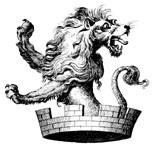
Needed: Formidable Bishops
TO REPAIR THE CHURCH
How many good Catholics are there in the average parish today? Does the pastor know? How would he decide? Would he dare to say to anyone: “You’re a bad Catholic, you know”? Forty years ago a priest could walk down a city street to inquire “Are you a Catholic?” and hear in return: “Yes, but I’m not very good at it.” Today, he is likely to be told: “Yes, but I don’t agree with the Church on many things.”
Forty years ago the norms of Catholicity were clear: Sunday Mass, chastity, valid marriage, Catholic education, sacramental life, good works, concern for the salvation of one’s soul and the souls of those in one’s care. By World War II, social scientists graded Catholics by the degree of their adherence to Catholic norms and structures. There were: (1) the “Enthusiasts,” said to compose about 10 percent of churchgoers, who obeyed the Commandments and helped run the parish or the diocese; (2) the “Regulars,” who did all that the Church expected of them worship-wise and sacramentally, without being activists; (3) the “Irregulars,” who retained Catholic identity without being noticeably pious, yet mostly managed to die with the Last Rites; and (4) the “Apostates.” Good standing in the Church was commonplace. Catholics knew which category they fitted into, and one did not have to be an apostate — or an excommunicate — to “feel” a low standing in the parish community.
During the post-World War II period, the movement of American culture away from its religious roots began to have its effect in Catholic circles. One old pastor, Msgr. John Moylan, took note of the changes that were taking place in the priesthood as early as 1955: “When I was ordained in 1904,” he recalled, “my new pastor greeted me with the remark, ‘They tell me you know a lot for a man your age. I don’t care what you know. Are you willing to work hard to help me save the souls of our people?'” Msgr. Moylan then added: “Sentimentality is creeping into the Church. Our new curate expects me to pay more attention to his excuses for not doing what he is supposed to do, than to the priestly work that we all must do.” The old man had the strange idea that the young priest came to St. Monica’s “to serve the parish and the pastor, not to have his personal wishes control what he would or would not do.”
Through most of John Moylan’s 50 years of parish priesthood the norms of Catholicity were clear, and respected. And to the amazement of Europeans, 75 percent of all American Catholics took those norms seriously — by living their lives according to Catholic norms.
You May Also Enjoy
According to San Francisco's Archbishop George Niederauer, homosexuality had nothing to do with clergy sex abuse cases.
Now it is pro-abortion Catholic politicians who are teaching the bishops the meaning of the Eucharist, something as absurd as it is unprecedented.
One function of the Catholic bishop is to insist upon the doctrinal integrity of the whole of the Church's teaching. Today's bishops have too often forgotten this.

